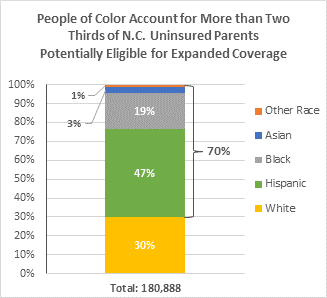By Fumi Agboola
Based on years of research, it is evident that public health insurance provides a critical level of financial protection to families, boosting children’s health and success in school. A new brief from NC Child, “Expanding Healthcare to Shrink Poverty,” explores the mechanisms underlying the economic hardships faced by families who have no health coverage. Family income is strongly related to health outcomes, academic achievement, and opportunity for their children.
Unfortunately, over 100,000 North Carolina parents are caught in the “coverage gap,” earning too much for Medicaid, and too little for health insurance through Healthcare.gov. The great majority of people in this “coverage gap” are working, but are unable to get health insurance from their employers, or purchase it on their own. These workers contribute to vital industries that support North Carolina’s economy, including construction, retail, food service, and child care.
Studies show that there are three major economic benefits of Medicaid expansion for families:
- lower out-of-pocket medical costs;
- preventive health care benefits that result in fewer lost wages; and
- higher credit scores by avoiding medical debt.
Lack of health insurance is linked to economic instability. A straightforward medical need like an injury or serious illness has the potential to put families into deep financial debt. Without adequate care, people can also have trouble returning to work after an accident or illness, creating a downward financial spiral. Creating more access to affordable health coverage in North Carolina would insulate many families against financial hardship, reducing the state’s high child poverty rate, and providing opportunities for the next generation of children in the state.
By protecting against unpaid medical bills, health insurance provides lower out-of-pocket spending, and therefore can lead to greater economic mobility for families. In addition to saving money, expanding health coverage through Medicaid would actually help many North Carolina families earn more money. Lack of care for injuries or chronic health conditions holds many people back from full-time employment. Furthermore, independent research and reports from other states estimate that closing the coverage gap would create about 40,000 new jobs for the state. This would significantly impact North Carolina families – especially for disadvantaged communities.
 Racial and ethnic minorities make up one-third of North Carolina’s total population; however, this demographic makes up more than two-thirds of the uninsured with incomes below the Medicaid threshold. This income gap has resulted in massive racial inequity in healthcare access that could be mitigated through expanded coverage.
Racial and ethnic minorities make up one-third of North Carolina’s total population; however, this demographic makes up more than two-thirds of the uninsured with incomes below the Medicaid threshold. This income gap has resulted in massive racial inequity in healthcare access that could be mitigated through expanded coverage.
Economic security is closely aligned with access to health care. Medicaid expansion could lower medical debt, create greater family savings, and provide more equitable access to care statewide. Closing the “coverage gap” has the potential to significantly shrink poverty in North Carolina.
Fumi Agboola is NC Child’s 2018-19 Research Policy Intern
Support NC Child’s work to ensure economic opportunity for all NC families. Click here to make a donation today.
